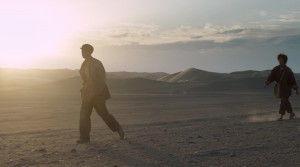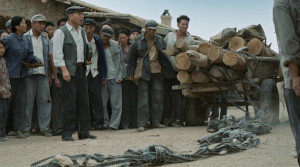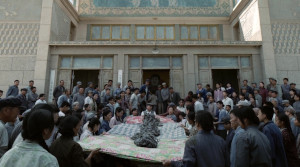

Yi miao zhong
China 2020
Genre:
Drama, Comedy
Director:
Zhang Yimou
Cast:
Zhang Yi
Liu Haocun
Fan Wei
Li Yan
Li Xiaochuan
Yu Yang

One Second

Story: A nameless man (Zhang Yi) wanders through the desert and finally arrives in a small desert town. There, he wants to see a movie, but he is too late, and a motorcycle courier is supposed to transport the film reel to the nearest small town in the desert where there is another amateurish cinema. The nameless man wants to go to the next town but sees how the little orphan Liu (Liu Haocun) steals the film reel. He follows her and is able to get the film reel back again. However, the motorcycle courier doesn't know about all that and already left without the film. So, the nameless guy sets out to go to the next town by foot, with Liu constantly following him. There, the two come across the projectionist who is simply called "Mr. Movie" (Fan Wei). The nameless guy returns the film reel, but Liu is able to make it credible that something is fishy with the nameless guy's story. He finally explains that he wants to see the movie because his daughter is supposed to appear in a film reel with the latest news of what's happening in the country. But he and Liu only have one part of the actual movie. The news film reel arrives shortly afterwards but has been dragged through the sand by a klutz and therefore has to be cleaned first if it is even at all possible to have a film screening. Still, Liu hasn't given up trying to get her hands on some part of the film reel. But what does she plan to do with it?





Review: Actually, "One Second" was supposed to be shown at the Berlin International Film Festival in 2019, but was withdrawn due to "technical difficulties". After a long time, Zhang Yimou finally made a somewhat more personal movie again, and so it was reasonable to assume that the Chinese government was not entirely satisfied with a few rather critical tones, which Zhang was known for in his earlier works. There is no doubt that Chinese censorship made sure that the movie, which was only released some time later, was cut/shortened in some way, or that maybe even some reshoots were necessary, but to what extent will remain unclear. What is certain, however, is that "One Second" is a slow-paced movie about the medium of film and movie magic, embedded in the historical context of a time when poverty was a daily companion in the country. As usual, Zhang spices things up with some wonderful images, even if he restrains himself on an artistic level.

The first thing that catches your eye, though, are the impressive panoramas of the desert and dusty roads. Thanks to the small towns, where life found a way to blossom despite all the adverse circumstances, the drama gets a very special touch. The movie may follow a slightly slower pace, but it never gets boring, because the story surprisingly comes along with a good dose of subtle humor and self-irony too. And that especially comes out when the inhabitants of the small town all do their part to make the screening of the propaganda flick possible. After all, this is the highlight of the month, and in one scene Mr. Movie even explains that he could basically show anything he wants, and people would still be thrilled as long as they get to see it in that fascinating medium of movie. On the one hand, Zhang is able to emphasize the magic of cinema as well as of a movie theatre, on the other hand, of course, this also criticizes the fact how easy it is to guide the people like that.

The two protagonists are also victims of poverty, which was a direct result of the Cultural Revolution. The suffering caused by the political system can be felt at every turn, but it is also humorously reflected by characters like Mr. Movie, who overestimates his governmentally assigned position as projectionist so much that he basically considers himself to be the mayor of the city. It would have been easy to make him the villain of the story, but Zhang is a bit more sensitive here. And when it comes to the two protagonists, it remains unclear for quite some time what the reasons for their actions might be too. They could also be seen as villains, especially since they make life difficult for each other all the time, but as the story progresses, we learn more about their lives and the drama moves into the spotlight. The girl and the nameless man create a beautiful, comedic dynamic with their game of cat-and-mouse, which keeps the story exciting despite its rather leisurely pace.

Zhang Yi plays the rather dogged but not all too bright adult, while Liu Haocun embodies a teenager who constantly wreaks havoc. Both already managed to convince critics in Zhang Yimou's "Cliff Walkers". As mentioned before, "One Second" is much smaller and more intimate than that flick, though. And due to the desert and the road movie element of the first half, you might also feel reminded of movies like "No Man's Land". Sometimes, the second half even feels like a chamber play celebrating the power of movie. Next to the townspeople, who all pull together, our protagonists seem completely out of place. Both are looking for something that has been taken away from them, both miss their family - and their suffering connects them in a special way, even if they don't realize it at first. Since they make life difficult for each other, the tragic note also gets some humorous touch.





The fact that the humor can be quite strange also becomes clear towards the end, when an important photo gets lost. It's those little scenes that stick in your memory. Because strictly speaking, "One Second" is not that impressive. Everything seems as if Zhang Yimou has shifted down a few gears. But that's also why later on, some scenes seem even more intense. My first opinion of the drama was quite critical, but the more time passed before I wrote this review, the better the impression "One Second" left on me got. Considering the fact that some interesting aspects have certainly fallen victim to the Chinese board of censors, you can only be surprised at how much criticism of Chinese propaganda actually still shines through. Or maybe it's just due to the fact that Zhang sometimes deliberately lets the propaganda element run riot, which a critical observer knows to interpret as criticism, while the propagandists can give their blessing with a warm content smile because everything falls into line with their rules. It would be almost laughable if it weren't so sad, and it is exactly these two aspects that Zhang manages to show in his movie.

Disclaimer










